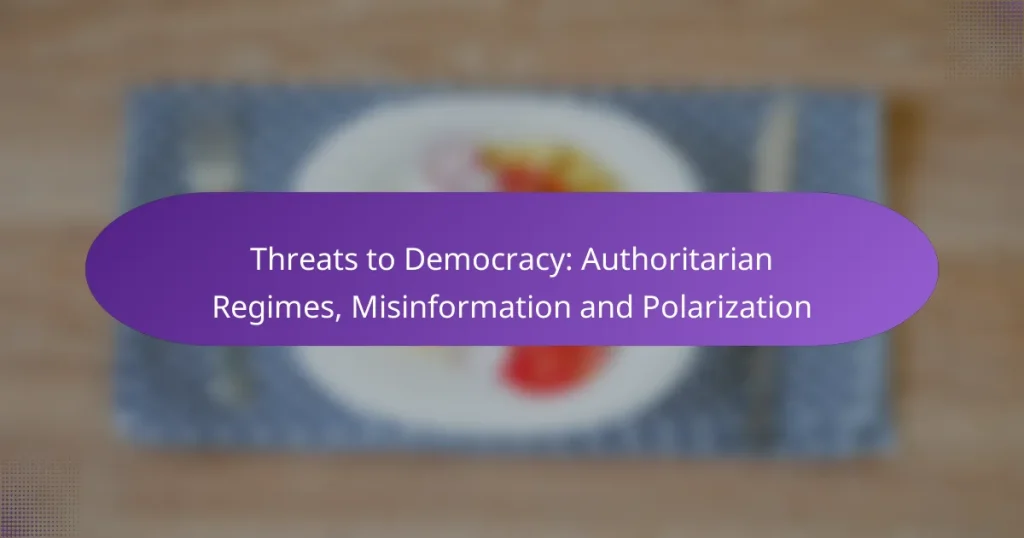Democracy faces significant threats from authoritarian regimes, misinformation, and political polarization. Authoritarian governments undermine democratic principles, while the spread of misinformation distorts public perception and erodes trust in institutions. Additionally, polarization deepens divisions among political groups, hindering effective governance and reducing civic engagement.
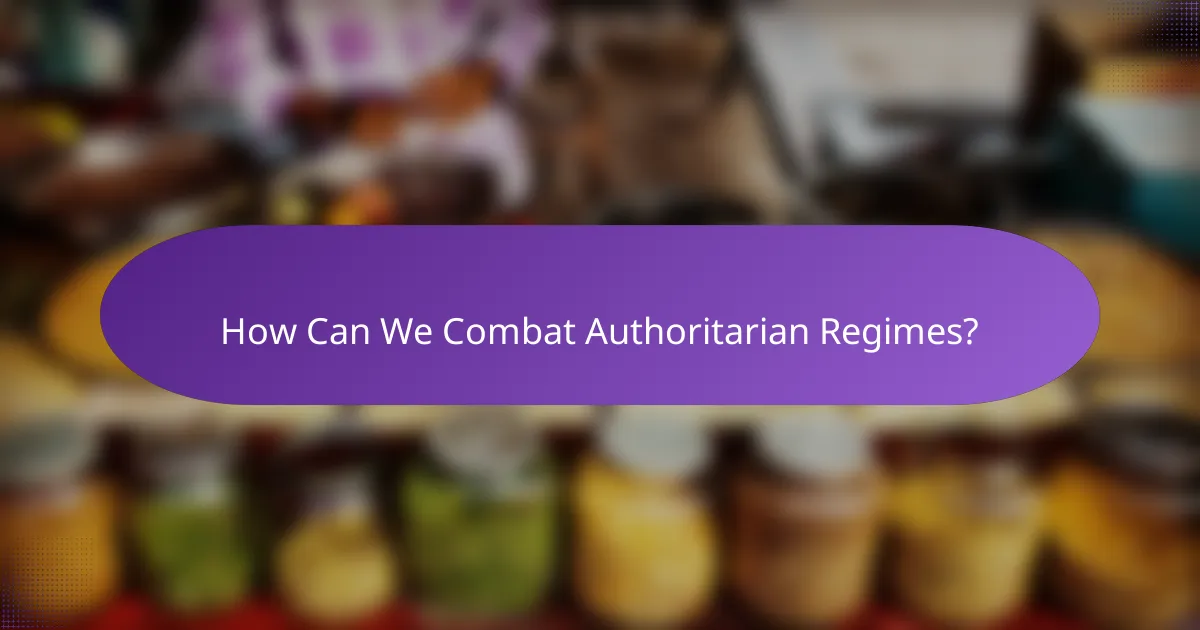
How Can We Combat Authoritarian Regimes?
Combating authoritarian regimes requires a multifaceted approach that includes international sanctions, support for democratic movements, diplomatic pressure, and the promotion of human rights. Each of these strategies plays a critical role in undermining oppressive governments and fostering democratic principles.
International sanctions
International sanctions are economic or political penalties imposed on countries to deter authoritarian behavior. These sanctions can include trade restrictions, asset freezes, and travel bans targeting key officials. Effective sanctions should be carefully designed to minimize harm to the general population while maximizing pressure on the regime.
For instance, sanctions against specific industries, such as oil or arms, can significantly impact a regime’s revenue without directly harming civilians. The success of sanctions often depends on international cooperation; broad coalitions can enhance their effectiveness.
Support for democratic movements
Supporting democratic movements involves providing resources, training, and advocacy for groups striving for democratic governance. This support can come in various forms, including financial aid, technical assistance, and capacity-building programs. Engaging with local organizations ensures that efforts are culturally relevant and sustainable.
Examples include funding grassroots campaigns, offering training in civic engagement, and facilitating international partnerships. It is crucial to ensure that support does not inadvertently empower extremist factions or lead to further polarization.
Diplomatic pressure
Diplomatic pressure entails using negotiations and dialogue to influence authoritarian regimes toward more democratic practices. This can include public statements, private communications, and multilateral discussions aimed at promoting political reform. Building coalitions with like-minded nations enhances the impact of diplomatic efforts.
For effective diplomatic pressure, it is essential to establish clear benchmarks for progress and to communicate the consequences of failing to meet those expectations. Regular engagement can also help maintain momentum and keep democratic aspirations alive within the country.
Promotion of human rights
Promoting human rights is fundamental in combating authoritarianism, as it lays the groundwork for democratic values. This can involve advocating for the protection of civil liberties, freedom of expression, and the right to assembly. International organizations often play a crucial role in monitoring human rights abuses and holding regimes accountable.
Efforts can include public awareness campaigns, legal assistance for victims of repression, and collaboration with international human rights bodies. By fostering a culture of respect for human rights, societies can create a more resilient foundation for democracy, making it harder for authoritarian regimes to maintain control.
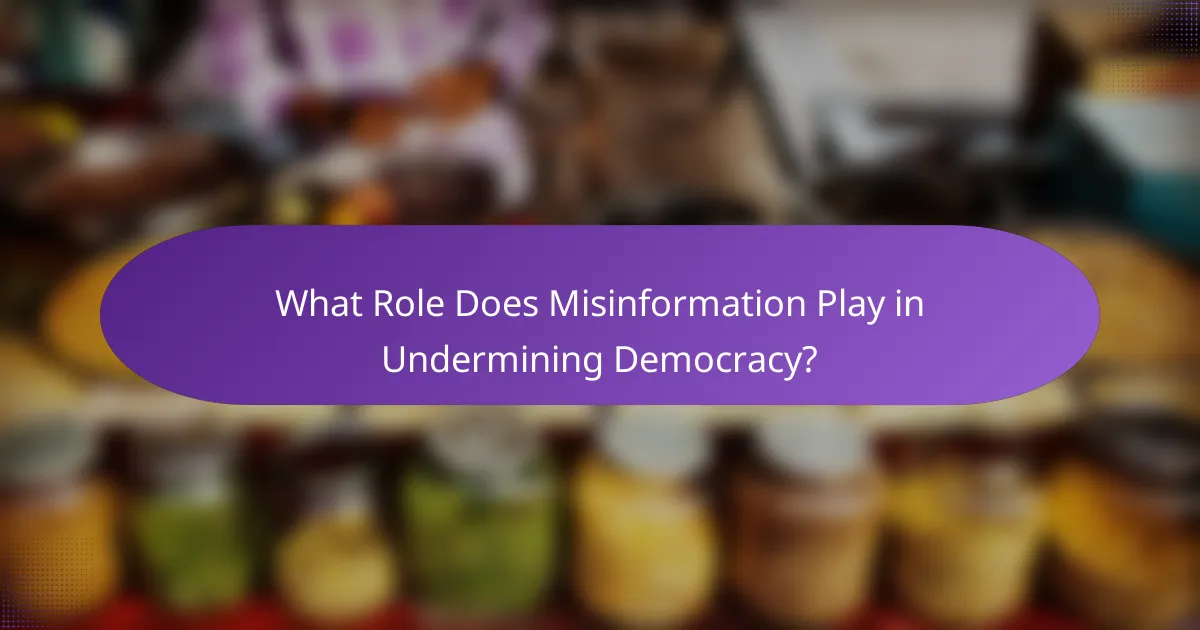
What Role Does Misinformation Play in Undermining Democracy?
Misinformation significantly undermines democracy by distorting public perception and eroding trust in institutions. It spreads rapidly through social media and other channels, leading to confusion and polarization among the electorate.
Spread of false narratives
The spread of false narratives is a primary mechanism through which misinformation operates. These narratives can be crafted to serve specific political agendas, often exploiting emotional triggers to gain traction. For example, misleading claims about election fraud can create unfounded fears that undermine confidence in electoral processes.
Social media platforms amplify these narratives, allowing them to reach vast audiences quickly. Users may share sensational content without verifying its accuracy, perpetuating the cycle of misinformation.
Impact on voter behavior
Misinformation can significantly influence voter behavior by shaping perceptions of candidates and issues. When voters are exposed to false information, they may make decisions based on inaccuracies rather than facts. This can lead to skewed electoral outcomes and a misrepresentation of public opinion.
For instance, if a large number of voters believe false claims about a candidate’s policies or character, they may be less likely to support that candidate, regardless of their actual positions. This distortion can undermine the democratic process by skewing representation.
Manipulation of public opinion
Manipulation of public opinion through misinformation can create divisions within society. By targeting specific demographics with tailored false narratives, entities can foster polarization and conflict. This tactic often aims to distract from legitimate issues or to rally support for controversial policies.
Moreover, the effects of misinformation can be long-lasting, as once a false narrative takes hold, it can be challenging to correct. Efforts to debunk misinformation must be timely and clear to effectively counteract its influence on public opinion.
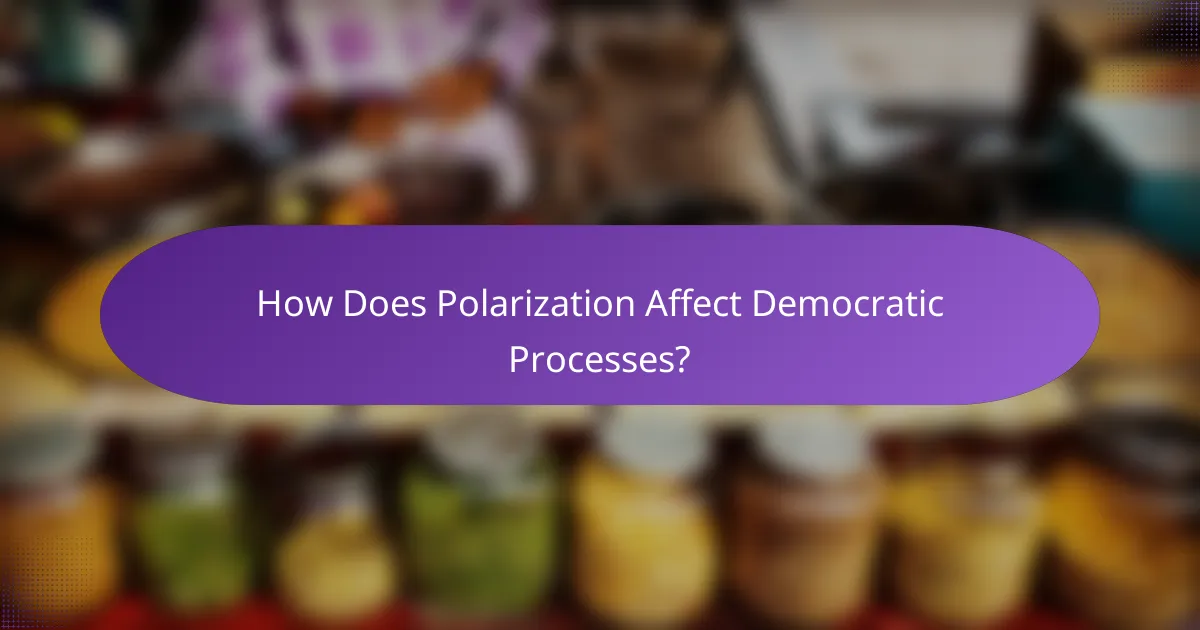
How Does Polarization Affect Democratic Processes?
Polarization significantly impacts democratic processes by deepening divisions among political groups, which can hinder effective governance and reduce civic engagement. This fragmentation can lead to a less cooperative political environment, making it challenging to achieve consensus on important issues.
Increased political division
Increased political division manifests as heightened animosity between opposing parties, often resulting in a lack of willingness to compromise. This division can create echo chambers where individuals only engage with like-minded perspectives, further entrenching their beliefs and reducing dialogue.
As polarization grows, the electorate may become more extreme in their views, leading to the election of representatives who prioritize partisan loyalty over collaborative governance. This shift can undermine the foundational democratic principle of representing a diverse constituency.
Challenges in governance
Polarization creates significant challenges in governance, as elected officials may struggle to pass legislation due to partisan gridlock. When political parties prioritize winning over effective policymaking, essential reforms can stall, affecting areas like healthcare, education, and infrastructure.
Moreover, the inability to reach bipartisan agreements can lead to increased public disillusionment with the political system, fostering a sense of helplessness among citizens. This scenario can perpetuate a cycle of disengagement, where voters feel their voices are not heard.
Impact on civic engagement
Polarization can diminish civic engagement by discouraging participation in democratic processes. When individuals perceive the political landscape as hostile or divisive, they may choose to withdraw from voting, attending town halls, or engaging in community discussions.
Conversely, some may become more active in advocacy, driven by a desire to combat perceived injustices. However, this activism often focuses on narrow issues rather than fostering broad-based coalitions, which can further entrench divisions rather than bridge them.
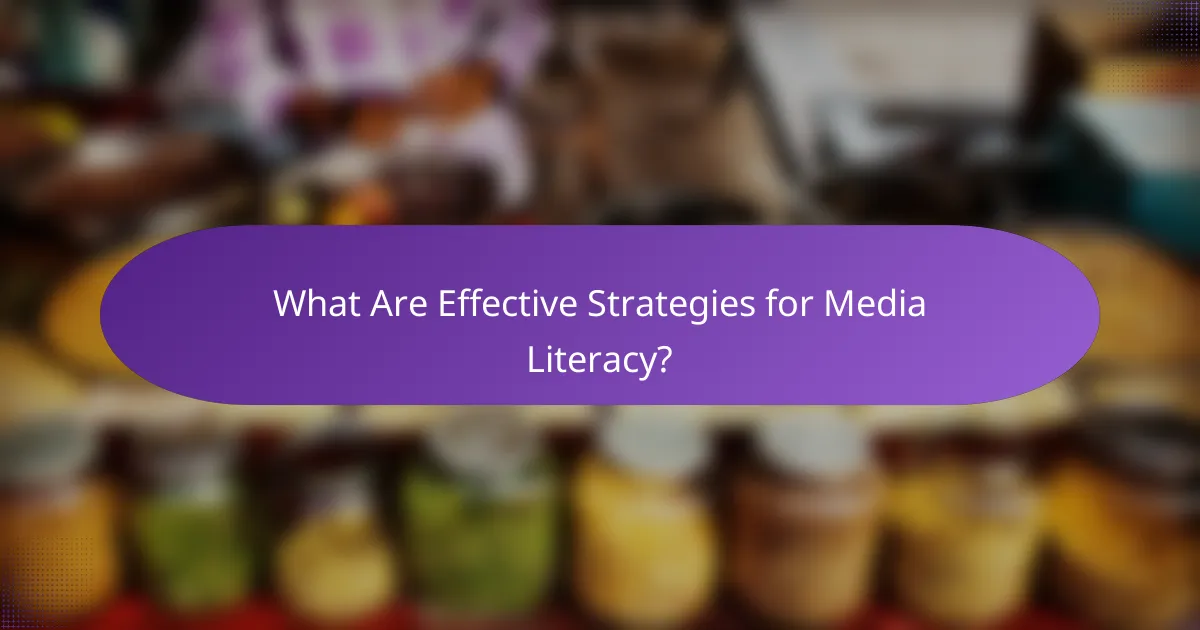
What Are Effective Strategies for Media Literacy?
Effective strategies for media literacy focus on enhancing individuals’ ability to critically evaluate information sources, discern fact from misinformation, and engage with media content thoughtfully. These strategies empower people to navigate the complexities of modern information landscapes, particularly in the context of rising authoritarianism and polarization.
Educational programs
Educational programs aimed at improving media literacy can be implemented in schools and community centers. These programs often include workshops, courses, and online resources that teach critical thinking skills, the importance of source evaluation, and the identification of bias in media. For example, a curriculum might incorporate case studies of misinformation campaigns to illustrate how easily false information can spread.
Additionally, programs should be tailored to different age groups, ensuring that children, teenagers, and adults receive age-appropriate content. Engaging formats such as interactive discussions and multimedia presentations can enhance learning and retention.
Fact-checking initiatives
Fact-checking initiatives play a crucial role in promoting media literacy by providing reliable assessments of claims made in public discourse. Organizations dedicated to fact-checking often publish findings on their websites, helping individuals verify information before sharing it. For instance, platforms like Snopes or FactCheck.org offer accessible resources for users to confirm the accuracy of news stories and social media posts.
To maximize impact, these initiatives should collaborate with media outlets and educational institutions to reach wider audiences. Encouraging users to engage with fact-checking tools can foster a culture of skepticism towards unverified information.
Community engagement
Community engagement is vital for fostering media literacy at a grassroots level. Local workshops, discussion groups, and public forums can bring together diverse voices to discuss media consumption practices and share experiences with misinformation. These gatherings can help build a supportive network for individuals seeking to improve their media literacy skills.
Moreover, leveraging social media platforms to create community-driven campaigns can amplify the message of media literacy. Initiatives like local challenges to verify news stories or share educational content can motivate community members to actively participate in combating misinformation.
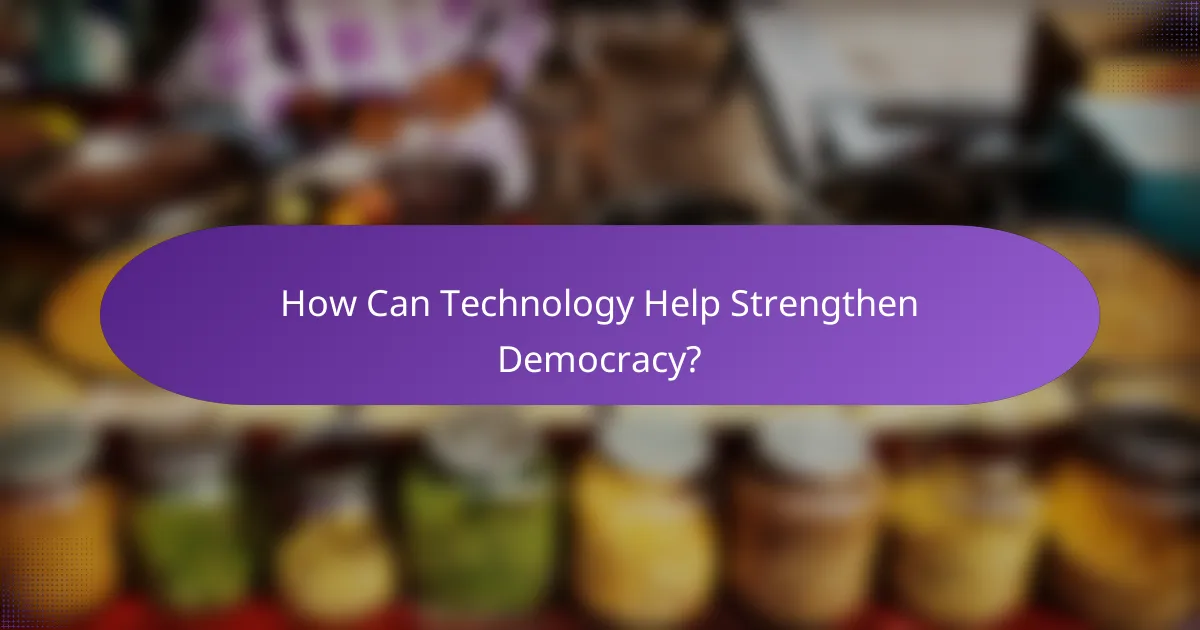
How Can Technology Help Strengthen Democracy?
Technology can play a crucial role in enhancing democratic processes by facilitating greater civic engagement and ensuring transparency in voting. By leveraging digital tools and innovative solutions, citizens can participate more actively in governance and hold authorities accountable.
Digital platforms for civic participation
Digital platforms enable citizens to engage in civic activities such as discussions, petitions, and community organizing. These platforms can range from social media networks to dedicated civic engagement websites, allowing users to voice their opinions and mobilize support for various causes.
To maximize effectiveness, these platforms should prioritize user accessibility and security. Features like user-friendly interfaces, multilingual support, and robust privacy protections can encourage broader participation. Additionally, integrating educational resources can help inform users about important issues and the democratic process.
Blockchain for transparent voting
Blockchain technology offers a promising solution for ensuring transparency and security in voting systems. By creating a decentralized and immutable ledger, blockchain can help prevent tampering and fraud, thereby increasing public trust in electoral outcomes.
Implementing blockchain for voting requires careful consideration of technical infrastructure and user experience. Voters should be able to easily access the system, verify their identities, and track their votes. Pilot programs in various regions have shown that blockchain can streamline the voting process while maintaining high security standards.
